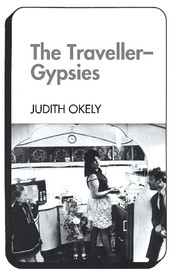Book contents
- Frontmatter
- Contents
- Dedication
- Preface
- 1 Historical categories and representations
- 2 Modern misrepresentations
- 3 Methods of approach
- 4 Economic niche
- 5 Self-ascription
- 6 Symbolic boundaries
- 7 Gorgio planning
- 8 Travelling
- 9 The trailer unit, spouses and children
- 10 Group relations and personal relatives
- 11 Gypsy women
- 12 Ghosts and Gorgios
- Concluding remarks
- Extract from The Scholar Gypsy
- Notes
- References
- Index
5 - Self-ascription
Published online by Cambridge University Press: 04 December 2009
- Frontmatter
- Contents
- Dedication
- Preface
- 1 Historical categories and representations
- 2 Modern misrepresentations
- 3 Methods of approach
- 4 Economic niche
- 5 Self-ascription
- 6 Symbolic boundaries
- 7 Gorgio planning
- 8 Travelling
- 9 The trailer unit, spouses and children
- 10 Group relations and personal relatives
- 11 Gypsy women
- 12 Ghosts and Gorgios
- Concluding remarks
- Extract from The Scholar Gypsy
- Notes
- References
- Index
Summary
Outsider's definitions
The sedentary society's attempts to identify Gypsies or Travellers have not coincided with the way Gypsies have identified themselves, and were often not intended to. Apparently ‘objective’ criteria such as country of origin, race, language, occupation or exotic culture have more often reflected the current interests of the Gorgio definer. For the central authorities, the problem seems to have been to find a sufficiently inclusive category which would cover all nomads or quasivagrants, whereas for folklorists and those charged with making local site provision for a select few, the concern has been with an exclusive category which would enable them, for different reasons, to discriminate between an acceptable minority and a mass of rejects. The different Gorgio definers' ‘objective’ criteria cannot survive the historical change to which country of origin, race, language, occupation and culture are all subject.
As an alternative Barth has suggested that ‘The fact of continuing dichotomisation between members and outsiders allows us to specify the nature of continuity and investigate the changing cultural form and content’ (1969:14). The dichotomisation between Gypsies and Gorgios is continuous. A broad definition of Gypsy and Traveller might be ‘Not Gorgio’. Travellers mark themselves off from the Gorgio or, in the case of Scottish and Irish Travellers, the ‘Flattie’ (Rehfisch 1958), ‘country person’ or ‘Buffer’. When Gorgios use the term ‘Gypsy’ or ‘Tinker’, however inaccurately, the Gypsies' consciousness as a separate group is also constantly reaffirmed from the outside.
- Type
- Chapter
- Information
- The Traveller-Gypsies , pp. 66 - 76Publisher: Cambridge University PressPrint publication year: 1983

